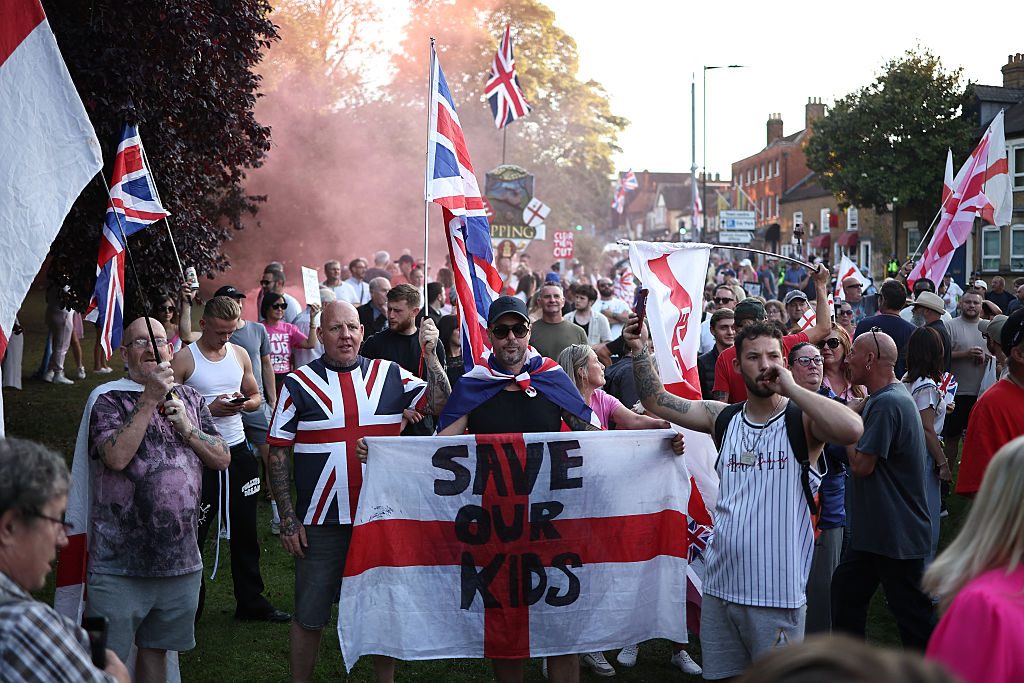When a majority begins to see itself as ignored and wronged, this is a major warning sign. In recent weeks, protests have erupted across England against the use of hotels to house asylum seekers. The unrest began in Epping after a migrant from Ethiopia staying at The Bell Hotel was charged with sexually assaulting a 14-year-old local girl. Since then, similar demonstrations have appeared in Norwich, Manchester, Bristol, East London, and numerous other towns.
These protests echo the demonstrations that followed the Southport murders in their core grievances: fear of violence by “foreigners,” sexual or otherwise, against locals — particularly children — as a consequence of permissive mass immigration. After the Southport murders last year, false rumours that the perpetrator was a Muslim asylum seeker helped spark riotous violence. The key difference is that the Southport unrest lasted only a week.
The current protests, by contrast, have persisted far longer and lack the graphic violence and destruction, which has lent them greater credibility. While localised protests are not immune to outside agitators — and far-Right groups are actively trying to exert influence — these demonstrations cannot simply be dismissed as astroturfed. Many have a significant female presence and are attended largely by locals who have likely never protested before, suggesting that genuine, grassroots discontent underpins them.
Crucially, these protests show that segments of the population are becoming more outspoken on immigration than they ever were before. A form of plebeian ethnonationalism — a populist radicalism rooted in attachment to nation, ethnicity, and culture, and resentment of liberal globalist elites — is gaining ground, particularly on the Right. Many now see themselves as under threat from mass immigration and demographic change, with their grievances dismissed by the political class.
This same political class also failed to prevent the exploitation of white working class girls by Pakistani grooming gangs and has repeatedly broken promises to curb immigration. Issues that could be addressed politically or legally, then, are instead being framed in tribal, identitarian terms. The recent “Operation: Raise the Colours” efforts across towns in England show that the St. George’s flag (and the Union Jack to some extent) is being increasingly deployed as an insurgent symbol of resistance and defiance — a tribal marker of territory à la Belfast.
Once identitarianism reaches this stage, it is real, serious, and cannot be underestimated. On the one hand, it can lead to racially motivated abuse and even violence. On the other, it shows that tribal consciousness is spreading and taking hold. In some Northern towns with a reputation for segregation — Oldham, Bradford, Rochdale — this white English tribalism is reinforced by biculturalism, where two dominant communities, one largely Pakistani-Muslim, the other white English and nominally Christian, live in parallel societies. In such towns, one area may fly the Pakistani flag on Independence Day to assert ethnic pride, while the other side raises St. George’s to signal its own.
The crisis in asylum policy, and the breakdown of its legitimacy, stems from years of government mismanagement. With no proper infrastructure to process claims, asylum seekers are dispersed into small towns where they cannot work or contribute while they wait. Yet anyone who challenges this status quo is cast as the problem, rather than the state that created it.
The Starmer administration faces a dilemma. If hotels remain open and asylum accommodation policies stay unchanged, protests are likely to continue. And even if tensions ease temporarily, it would be little more than a short-lived ceasefire. Public anger runs deep, and anti-migration radicalisation is poised to explode.
